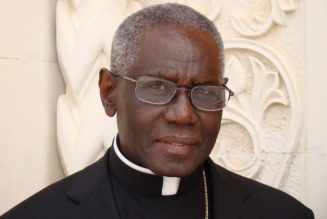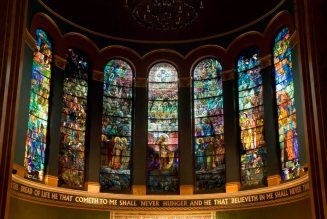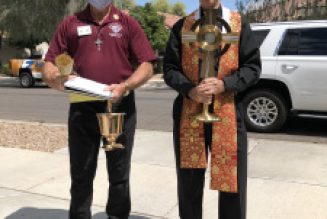, January 28, 2021

It seems like the whole Western world has hardened its heart to the voice of God.
In The Benedict Option, Rod Dreher spells out how a series of philosophical moves starting with William of Ockham boxed the secular West into a hopelessly godless corner. In his brilliant and important new book The Rise and Triumph of the Modern Self, Carl Trueman adds poetry, psychology, and science as antagonists in that story.
Their critiques are necessary but can end up making the reader feel helpless, as if the world faces an unassailable wall of misunderstanding that renders the voice of God unintelligible to our world.
This Sunday, the Fourth Sunday in Ordinary Time, Year B, the Church shows a shortcut out of the citadel of secularism: Jesus Christ.
The way the Gospel explains how the crowd reacted to Jesus is remarkable.
“The people were astonished by his teaching,” it says. “All were amazed and asked one another, ‘What is this? A new teaching with authority.’”
We can imagine what that was like. It was like listening to Fulton Sheen, Mother Angelica, Bishop Robert Barron or your favorite YouTuber explain the teachings of Jesus Christ in new ways that uncover their astonishing layers of meaning.
Or it is like Mother Teresa explaining authentic charity as someone who has actually lived it; or St. John Paul II speaking on human freedom after emerging triumphant from a lifelong struggle with Naziism and Communism.
Every once in a while the voice of God pierces our outer defenses and takes us by surprise. But why aren’t we astounded daily by the Word of God?
The answer is in the Psalm, which says “If today you hear his voice, harden not your hearts.” It shows us the attitudes a softened heart has to have.
First, you need to actually see Jesus Christ as a savior, something that has become difficult in a secularized world.
The Psalm begins by inviting us to “sing joyfully” to the Lord, “acclaim the rock of our salvation,” and “come into his presence with thanksgiving.”
Today’s Gospel shows why those original listeners saw Jesus as a savior. The ancient world was hyper aware of the presence of demons; they knew that they were continually beset by supernatural villains.
Confronted with demonic possession, Jesus does none of the arduous and extensive exorcism procedures of his day. Instead, he simply says: “Quiet! Come out of him!” And the demons obey. This is clearly a new thing on the earth: a holy man greater than the prophets, master of the supernatural, coming to save us.
Our time is no less demon-vexed, but our problem is that rationalism has left us blind to the presence of the supernatural. If we understood how often the powers of hell seep into our world, we might appreciate our savior more, too.
Based on his reading of the Gospels and his understanding of psychology, Fulton Sheen explains three ways the signs of the demonic are prominent in our secularized world.
- Demons revel in a love of nudity because they love to mock our animal nature, which they disdain, and which our world is obsessed with in immodesty and pornography.
- Demons love violence because while they cannot harm God, they can harm his image and likeness in us — and from our movies and video games to abortion, war, terrorism, and rioting, our world is drenched in violence.
- Last, demons love to sow division because they want to tear apart the bonds of Christ in marriage and in the very body of Christ which is the Church.
But Jesus “commands even the unclean spirits and they obey him;” in the Gospel and in our lives.
Next, you have to accept God as the shepherd of his people, which is utterly foreign to secularism.
Second, to harden not your heart you must “bow down in worship,” says Sunday’s Psalm, “and kneel before the Lord who made us” acknowledging that “we are the people he shepherds, the flock he guides.”
We find that extremely hard to do. But you can imagine how Jesus’ first audience did, too.
They were laboring under Roman rule, sick of paying taxes to a government that does objectionable things, crucifixion notable among them. They were hungry for an authentic expression of their faith, something better than what was offered by the Sadducees, who had cozied up to the Romans, or the Pharisees, who “tie up heavy burdens hard to carry and lay them on people’s shoulders, but will not lift a finger to move them.”
They knew well that they could expect something more. God had promised them in today’s First Reading: “I will raise up for them a prophet like you from among their kin and will put my words into his mouth; he shall tell them all that I command him.”
When Moses first reported those words to the Israelites, they were revolutionary. A personal God who joined in their struggles to lead them out was something new. They had that in Moses and we have it in an infinitely greater way in Jesus Christ, through means that are impossible for materialists to accept: his sacraments, his word, and his body, the Church; each a material thing that he makes into a channel of supernatural grace.
Last, the Psalm says to try this: Instead of making your heart into a rock, trust the rock God gave you.
Here in the 21st century, we are in much the same situation as the Israelites were so long ago.
We don’t live under Egyptian or Roman rule, but we do live in a land that often barely tolerates our religion, while demanding we pay taxes to a government that does objectionable things, abortion notable among them.
We don’t have Sadducees and Pharisees, but we do have competing voices from the extremes of religious experience, one coaxing, “Relax your standards and accommodate with the world!” and the other shouting, “Nothing is ever good enough!” One group of Catholics aligns with the secular Left and doubts the Church because they think it’s too conservative; another aligns with the secular Right and mistrusts the Church because it’s too liberal.
It all amounts to what happened at Meribah, at Massah in the desert, when the Israelites refused to trust God’s promise to Moses and thought they knew better. They didn’t trust that God would provide water for them through the means he sent, a rock; and we don’t trust that God has provided for us in the rock he sent to us, the Church.
Interrupting both comes the one and only authentic voice of God. You can hear him in the words of St. Paul today: “I should like you to be free of anxieties.” You hear him in the Gospel, sternly commanding the spirits of death: “Quiet! Come out of him!”
God is speaking, everywhere. It may be harder to hear him in the 21st century, but when you do hear him, harden not your heart: Listen, trust, and follow.
Image: Do Gerard, Astronomer by Candlelight, Wiki-media commons.
Tags: Fourth Sunday in Ordinary Time (Year B), prayer, Sunday Gospel, Sunday Readings
Never miss a post! Subscribe below to our weekly newsletter.
Related
Join Our Telegram Group : Salvation & Prosperity









